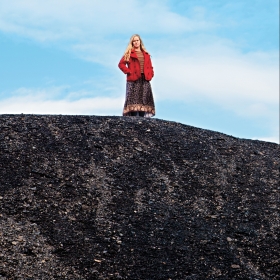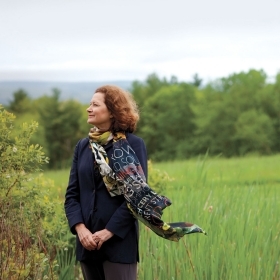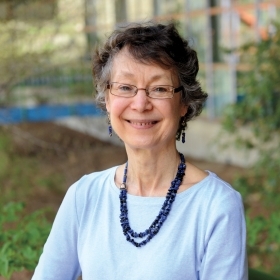For Ashley Funk ’16, climate change is the defining issue of her generation. She is working tirelessly to safeguard the future of the planet.
For Ashley Funk ’16, climate change is the defining issue of her generation. She is working tirelessly to safeguard the future of the planet.

Ashley Funk ’16 stands atop a pile of coke waste behind her childhood home in Mount Pleasant, Pa.
It’s a chilly early winter evening in Wellesley, but in the Homestead kitchen, the atmosphere is welcoming and warm. Nine of the 14 members of SCoop, the College’s sustainability cooperative, are gathered around the big plywood table to share a Monday night supper of onion soup and squash enchiladas. The toasted croutons for the soup are made from day-old bread rescued from a dumpster.
As they eat, the group reviews a poster made for an upcoming talk by the Wellesley Centers for Women’s renowned scholar of white privilege, Peggy McIntosh. It’s part of the “Going Beyond Green: Race, Difference, and the Environment” lecture series that students in Environmental Studies have put together around topics of diversity and inclusion in the environmental movement. SCoop is one of the series’ co-sponsors.
If it weren’t for an iPad charging at the kitchen outlet, a visitor might think the scene was a 1960s commune, the subject under discussion action against the Vietnam War. But this is 2014, and one of the primary concerns for many of these young women is combating climate change.
For SCoop member Ashley Funk ’16, activism is second nature. When she was still in high school, Funk—who grew up in Mount Pleasant, Pa., an Appalachian town built on, and ravaged by, coal mining and coke production—petitioned the Pennsylvania environmental-quality board to urge increased regulation of greenhouse-gas emissions.
But her efforts to clean up and protect the environment started even earlier. “I was doing a lot of smaller-scale environmental work in my town,” Funk recalls. “I helped start a curbside recycling program, and I was trying to get recycling at the high school. And I was doing lots of litter cleanups and was reaching out to our borough and the township to make that all happen.”
‘I have a history of mining in my family. My grandfather died of black lung. … I recognized early that there were problems within my town, and I was always trying really hard to change things.’
—Ashley Funk ’16
Suing The State
Funk’s efforts had begun to get local press attention, and a national nonprofit, Our Children’s Trust, was looking for plaintiffs in different states to participate in atmospheric trust litigation (ATL). The idea behind ATL, which has been used in courts all over the world, is to provide a legal mandate for governments to address climate change and protect the atmosphere from harmful emissions. The approach is rooted in the “public trust doctrine,” a legal principle that states that governments are responsible for protecting natural resources, including the air. The public trust doctrine also may be construed to embody the human-rights principle of intergenerational justice, thus allowing young people to hold the government accountable for failing to safeguard the atmosphere they will inherit and depend upon for their survival in the future.
Our Children’s Trust reached out to Funk the summer after her junior year in high school. “They asked, ‘Hey, are you interested in doing broader-based stuff?’ And I said, ‘Absolutely!’ I was in this small town, and I didn’t have that many resources. I was just doing what I thought I could. I wanted to be focusing on bigger issues. They asked if I would be willing to serve as the plaintiff for the state.” Funk agreed, and worked with a pro bono attorney to craft and present a rulemaking petition to the Pennsylvania Environmental Quality Board.
“Ashley is a powerful young leader who isn’t afraid to tackle challenging problems to safeguard the livelihoods of future generations and the planet,” says Meg Ward, communications and outreach coordinator for Our Children’s Trust. “We’ve been so lucky to work with [her] over the past several years. She’s been a huge inspiration to all of us at Our Children’s Trust and to the young people and decision-makers she’s presented to. … She has worked tirelessly and isn’t about to give up. There’s a fire in her. She’s one to watch.”
In her final presentation to the Environmental Quality Board on Aug. 19, 2014, Funk stood before the group and said, “I grew up in an old company town where my backyard was an expansive, black ash dump, and the creeks ran orange from acid mine drainage. While I could visibly see how mining coal had impacted the immediate environment of my town, I started to recognize that burning fossil fuels like coal was doing even more harm to one of our most precious natural resources—our atmosphere.”
She concluded by saying, “We need to act—now. We need to work to create a healthy atmosphere and stable climate—now. Not only is it the right thing to do for present and future generations, it is what our Commonwealth’s constitution requires.
“Accordingly, I respectfully request that the board grant my petition and have the Department of Environmental Protection institute a public rulemaking process about how to establish an emissions reduction strategy in line with achieving a safe atmospheric concentration of CO2 by 2100.”
[supporting-images]
Despite Funk’s eloquence and her two-year-long effort with attorney Kenneth Kristl, the director of the Environmental and Natural Resources Law Clinic on the Wilmington, Del., campus of Widener Law School, the petition was turned down.
Funk was frustrated, she says, but not surprised. “I kind of expected that to happen, because people don’t want to take [emissions reduction] on. It’s a big thing to do, especially when the industry right now is natural gas. To say that you’re going to limit greenhouse gases would have huge repercussions—and they weren’t ready for that. They weren’t ready to actually tackle something that big.”
Despite the negative ruling, Funk says her petition “forced the DEP to actually think about climate change, and to actually write a report on how they were addressing climate change. They had to spend months thinking about it, and months trying to prove they were doing enough—and maybe, somewhere along the line, someone thought, ‘Hey, we’re really not doing enough.’”
Jay Turner, Wellesley College associate professor of environmental studies, whose research concerns the recent history of United States environmental politics and policy, agrees that the legal effort was not wasted. “One point that becomes abundantly clear is that this isn’t just about this generation, or the kind of the people who are working in these mines now, or in these power plants now. This is about the youth. They are the plaintiffs. And to give them a voice in a court of law—that’s exciting.”
He adds that Pennsylvania has a very long tradition of conservation. “They’ve got a constitution that includes some pretty ambitious language about protecting natural resources. And so to take that old language and draw on that to hold the state accountable for how they’re regulating or addressing climate change is impressive. [The plaintiffs] made headway that I don’t think anybody anticipated that they would make.”
Next steps remain up in the air for the Pennsylvania petition. “We are in the process of determining what the most appropriate follow-up legal action will be, but there is no question that the effort is not over,” says Nate Bellinger, climate law fellow with Our Children’s Trust. “There were many positive things that came out of the effort, notwithstanding the ultimate denial of the petition for rulemaking. Though the [Department of Environmental Protection] did not end up adopting the petition, the public learned a lot about the DEP’s position on climate change. Furthermore, we were able to spread the word throughout Pennsylvania about the need for additional action on climate change and gained the support of many organizations and individuals, including Dr. James Hansen, one of the world’s top climate scientists.”
The Making of an Environmentalist
“I have a history of mining in my family,” says Funk. “My grandfather died of black lung. We grew up really poor. I recognized early that there were problems within my town, and I was always trying really hard to change things.”
Her family lived in a series of houses during her childhood, including the one with the ash dump in the backyard that Funk described so poignantly to the Pennsylvania Environmental Quality Board. “Growing up, I was so connected with the woods and the mountains,” she says. “But there are huge mountains of coal waste in the woods around my town, and chemicals leach into the water. Instead of having a playground as a kid, I had a mountain of waste left behind by coal mining.” She recognized early that “something’s wrong here. You shouldn’t be seeing all of this. I just wanted to look for solutions.”
And finding solutions meant getting to college. Funk and her identical twin sister, who is studying cognitive science at Vassar, were highly competitive with one another. “We both wanted to get out, and we knew that we had to get scholarships,” she says. “We were both really driven academically.”
Funk applied to college via QuestBridge, a program for underrepresented, low-income youth. “I didn’t know what Wellesley was, but I wanted to study engineering and I wanted to study liberal arts, and the options for that are very limited,” she says. “I didn’t want to go to California, because I thought I would never be able to afford the plane ride. I didn’t want to stay in the state of Pennsylvania; I wanted to go explore. So I chose Wellesley. I knew that Wellesley wasn’t a premier environmental college, but that was OK with me because I thought, ‘Well, I can help make it better, since I’ve had experience doing that.’”
Once at the College, Funk says, “I found communities that made me feel great. SCoop has been one of the most important experiences I’ve had here, because it’s honestly a family. Sitting down for dinner together four days a week is a beautiful thing.”
As a first-year, Funk was a founding member of Fossil Free Wellesley (FFW), a student group that petitioned the Board of Trustees, asking the College to divest itself of direct holdings in the largest 200 publicly traded fossil fuel companies. The board appointed a working group of trustees, faculty, and administrators, including President H. Kim Bottomly, that met with FFW students through the fall of 2013. The board ultimately turned down the petition, deciding that the cost of divestment to Wellesley would be high and the economic impact on fossil fuel companies insignificant. But the conversation that FFW started raised questions about sustainability that are still being discussed—and addressed—in a variety of forums. These include the Sustainability Advisory Committee, a group of faculty, staff, and student representatives who advise President Bottomly on strategies to implement greener policies at Wellesley. Funk is one of two students on the committee.
“The administration, I think, has been pretty receptive to a lot of things,” says Funk. “It varies for what you’re working on, necessarily, but with a lot of the things I’ve been doing, they’ve been actually willing to work with us and meet with us.”
Activism & Engineering
Funk arrived on campus suspecting she was going to be an environmental activist and certain she would pursue environmental studies and engineering. She’s enrolled in the College’s new 4+1 program with Olin College of Engineering, a five-year commitment that will allow her to earn a Wellesley B.A. in environmental studies and a second bachelor’s in sustainable engineering design at Olin. (Last fall, Funk was awarded a prestigious Greater Research Opportunities fellowship from the U.S. Environmental Protection Agency in support of her efforts toward the reduction of CO2 emissions.)
‘I was in this small town, and I didn’t have that many resources. I was just doing what I thought I could. I wanted to be focusing on bigger issues. [Our Children’s Trust] asked if I would be willing to serve as the plaintiff for the state.’
—Ashley Funk ’16
Engineering has turned out to be a great fit for the action-oriented student. “At Olin last semester, I took a course in collaborative design,” she says. “I realized that the team dynamics, figuring out how to make groups most efficient, was like activism. The two things intersect, and they can both benefit each other so much. Activists could learn a lot from the efficiency of engineers, and engineers could learn a lot by being inspired by something. A lot of engineers just like building things. But I think it’s really important to have a sense of meaning with your work.”
Working to spread the word about sustainability is one of the things that gives Funk’s efforts meaning. “We can make Wellesley as sustainable as possible, but if we’re not actually showing that to the students, I don’t think that it has as big an impact as it could,” she says. “Even if Wellesley didn’t have any carbon footprint, it’s still not affecting that much in the entire world. But if we educate every single one of the individuals here about how important that is, they’re going to carry that on in their lives, whether they’re doing things in politics or economics, or whatever they’re doing. I feel like we’re not bridging that gap to actually reach students enough, and I want to try to fix that.”
In the face of the struggle ahead, Funk remains hopeful that change can and will happen—at Wellesley and well beyond. “I think that I’ve always been driven by a sense of optimism. I think that you have to be optimistic or you’re just going to get bogged down. Otherwise, everything that I want to do would be meaningless. If I just accepted that we’re doomed, then I wouldn’t go on. Hope is a necessary component.”
[substory:1]
 Catherine O’Neill Grace, a senior associate editor of Wellesley magazine, is grateful to SCoop for welcoming her into their kitchen.
Catherine O’Neill Grace, a senior associate editor of Wellesley magazine, is grateful to SCoop for welcoming her into their kitchen.



